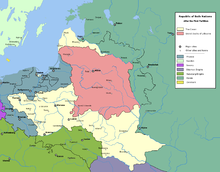- Danzig law
-
Danzig law (German: Danziger Willkür;[1] in Polish: Gdański Wilkierz [2]) was the official set of records of the laws of city of Danzig (Gdańsk). Danziger Willkür means „Danzig's choice by free will“, as opposed to having been imposed from outside, as while part of the Monastic state of the Teutonic Knights. Nowadays, the meaning of Willkür has eroded to "arbitrariness".
Contents
History
 Danzig while part of the monastic state of the Teutonic Knights
Danzig while part of the monastic state of the Teutonic Knights
 Danzig not affected by the First Partition of Poland (1772)
Danzig not affected by the First Partition of Poland (1772)
The models for the Danzig Law were the statute books of the Holy Roman Empire and of other Hanseatic cities, especially Lübeck. The merchant city received Lübeck law in 1226.
The official copies of laws were certified by attaching seals (sigilla) as means of authentication. The earliest known seal of the city of 1224 was inscribed, in capital letters, Sigillum Burgensium in Dantzike,[3] Latin/German of the empire for "Seal of the burghers in Dantzike".
In the 15th century, the Prussian Confederation was founded to reform, later oppose the policy of the Teutonic Order. The Prussian Confederation then supported seceding from the Monastic state in 1454, triggering the civil war amongst different factions in Prussia resulting in Thirteen Years' War. During that time, Danzig continued with its own set of law system, which its self-government. The recognition of this law, and other Danzig's privileges, by the King of Poland was a prerequisite for allying with him resp. subjecting as Royal Prussia to his overlordship. The Second Peace of Thorn of 1466 confirmed the rights. When they were in danger in the 1570s, it led to the Danzig rebellion and the Siege of Danzig (1577).
In the First Partition of Poland in 1772, the Kingdom of Prussia took over Royal Prussia (but not yet Danzig and Thorn (Toruń) and called it West Prussia. The Latin names Prussia Orientalis and Prussia Occidentalis were for centuries prior used for both parts (East and West) of Prussia. Danzig continued its self government for two decades to come, then in 1793 was annexed by the Kingdom of Prussia and its Prussian Danzig Law codes were supplanted by standardized Prussian laws.
Danziger Willkür
There were several incarnations of the laws that mainly covered internal government:
- 1435-1448 (draft)
- 1455 first known written form [4]
- 1479-1500
- 1574 during succession dispute leading to the Siege of Danzig (1577)
- 1597 Der See- und Handelstadt Dantzig Rechte oder Willkür ("The Laws of the Sea and Trade City of Danzig")
- 1678 (draft)
- 1732 Re-print of the 1597 Danzig Laws, by Seelmann, Danzig
- 1761[5]
Danziger Privilege
The privileges of Danzig confirmed rights of Danzig in external relations, like trading, coinage, and since 1454, with the Polish Crown. For example, the ius indigenatus was a requirement for people to hold office in Royal Prussia, and thus the city as well. It limited offices and land ownership to local natives. Each new king had to confirm the privileges. When this was in danger in the 1570s, it led to the Danzig rebellion.
Danzig had a special status, due to its large population (in 1772 47,600 inside the city walls, 35,000 to 40,000 outside), its harbour and wealth. Some of its politicians maintained that it was loyal only to the King of Poland, claiming that its status was similar to an Imperial Free City. This position was never accepted by the Sejm. Modern German author compare it to status of Marseille in 16th and 17th century towards the French King.[6]
Historians
Already in the 17th century, local historians studied the history of Danzig law, such as Elias Constantius von Treuen-Schroeder (1625–1680) and Johann Ernst von der Linde (1651–1721). They did not publish, but Gottfried Lengnich acknowledged their work in the foreword to his Ius publicum civitatis Gedanensis oder der Stadt Danzig Verfassung und Rechte (Public law of the city of Danzig, or the city's constitution and rights, 1769).[7] Lengnich wanted to find out whether "us Prussians ... are the Poles equal brothers or their servants"[8] and encouraged others to study local history, too. Among others Michael Christoph Hanow, Georg Daniel Seyler and David Braun studied the history of their home towns.
See also
References
- ^ "Danziger Willkür"
- ^ "Gdański Wilkierz"
- ^ "Sigillum Burgensium in Dantzike"
- ^ Philine Helas: Festschrift für Horst Bredekamp, Published 2007, Akademie Verlag,ISBN 3050042613 [1]
- ^ Tadeusz Maciejewski, Zbiory wilkierzy w miastach Państwa Zakonnego do 1454 i Prus Królewskich lokowanych na prawie chełmińskim (Collections of willkürs for the cities of the Teutonic Order State and Royal Prussia located under Kulm Law), Uniwersytet Gdanski, Gdansk 1989 (German edition, comment in German)
- ^ Gegenüber der Szlachta und dem Sejm berief sich die Stadt auf den polnischen König als alleinigen Oberherrn: "daß die Stadt dem Könige von Polen, sowohl dem regierenden als dessen erstgekrönten Nachfolgern, und sonst niemanden die Treue gelobet [...]. Wannenhero es ein Fehler ist, wann zuweilen vorgegeben wird, die Republik Polen sei Herr über die Stadt und ihre Rechte [...]. So oft nun die Republik sich einiges Recht über die Stadt anmassen und sie ihren Verordnungen unterwerfen wollen, wozu insonderheit die Zeiten, wenn der königliche Thron erlediget gewesen, Gelegenheit gegeben, hat die Stadt jederzeit behauptet, daß sie unter keines anderen, als des einzigen Königes Herrschaft stehe" (Lengnich, Ius publicum civiatis Gedanensis). Um dieser einseitigen Rechtsposition, die vom Sejm niemals anerkannt wurde, größere Plausibilität zu verleihen, verglich der Rat der Stadt den Status Danzig mit dem deutscher Reichsstädte. Historisch und staatsrechtlich plausibler wäre wohl die Analogie zur Stellung Marseilles gegenüber dem französischen König im 16. und 17. Jahrhundert - p. 115f, Hans-Jürgen Bömelburg, Zwischen polnischer Ständegesellschaft und preussischem Obrigkeitsstaat: Vom Königlichen Preußen zu Westpreußen (1756-1806) 1995, Oldenbourg Wissenschaftsverlag Prussia (Germany) ISBN 3486561278 [2]
- ^ In seiner Vorrede rühmt Lengnich die ungedruckt gebliebenen Werke der Danziger Staatsrechtler Elias Constantius von Treuen-Schroeder (1625-1680) und Johann Ernst von der Linde (1651-1721) - Dick van Stekelenburg: Michael Albinus "dantiscanus" (1610-1653): Eine Fallstudie zum Danziger Literaturbarock, 1988, ISBN 9062037704 [3]
- ^ Karin Friedrich, The Other Prussia: Royal Prussia, Poland and Liberty, 1569-1772 [4]
Literature
- Des Syndicus der Stadt Danzig Gottfried Lengnich ius publicum civitatis Gedanensis oder der Stadt Danzig Verfassung und Rechte, 1769, published by Otto Günther, Danzig 1900 (initially only intended for internal use within city administration) [6]
- Paul Simson: Geschichte der Danziger Willkür. Quellen und Darstellungen zur Geschichte Westpreußens Nr. 3. Danzig 1904 [7]. Reprint: Nicolaus-Copernicus-Verlag, Münster 2006, ISBN 978-3-924238-36-0. [8]
- Hans-Jürgen Bömelburg, Zwischen polnischer Ständegesellschaft und preussischem Obrigkeitsstaat: Vom Königlichen Preußen zu Westpreußen (1756–1806) 1995, Oldenbourg Wissenschaftsverlag Prussia (Germany), ISBN 3486561278 [9]
Categories:- History of Gdańsk
- Legal history of Germany
- Legal history of Poland
Wikimedia Foundation. 2010.

